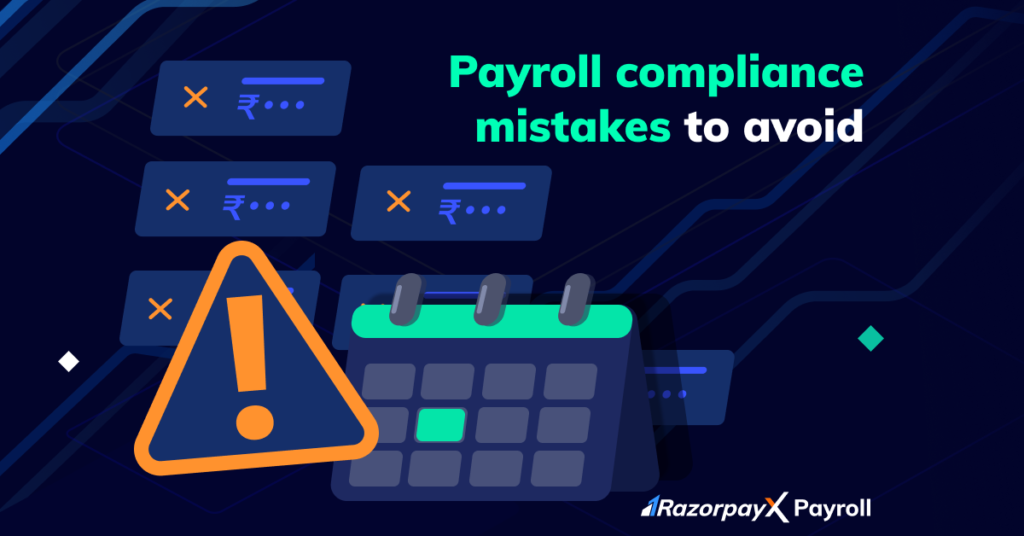10. Security lapses
Security lapses occur due to manual processing and management of payroll data. It exposes businesses to probable payroll frauds, such as the theft of confidential information of their employees (details of their salaries, taxes, bank account, PAN, Aadhar Card, rent agreements, etc.), misappropriation of payroll funds, and unauthorised issuance of salary and TDS certificates.
Even if the payroll data is stored on spreadsheets, hacking the system passwords makes it vulnerable to misuse.
Avoid these payroll compliance mistakes via automation.
An automated payroll solution is the way to go to avoid all these payroll and compliance mistakes. Here’s how.
- An automated solution stores all payroll data and records at a centralised place in an organised manner, right from the employee onboarding
- It automates the process of recording up-to-date employee data, performing complex and time-consuming salary and tax calculations, reminding the tax, EPF, and ESI filing deadlines, and generating error-free reports of employees’ salary structure and payroll disbursements
- It takes regular backups of payroll data, stores them in a safe place, and restricts access to confidential data
RazorpayX Payroll – a fully automated payroll compliance solution
RazorpayX Payroll automates all things payroll right from employee onboarding to salary disbursals and tax payments. The specifically designed features meet the payroll requirements of SMEs and startups.
The software handles all payroll payments and filings of compliances like TDS, PF, ESI, and PT. It also empowers your employees to access their own account, where they can easily declare investments, view/download payslips, apply leaves, etc.
So, if you are looking for an efficient solution to meet all your payroll requirements, then RazorpayX Payroll is the right solution for you.
Payroll compliance is one of the most important processes a business performs month-on-month, to keep its engines running smoothly. All businesses must adhere to statutory compliances concerning fair monetary disbursements to their employees, registration for Provident Fund and ESI, statutory tax deductions, calculation and payment of gratuity, bonus, pension, etc.
But, payroll compliance can be very complicated. Here are the top 10 mistakes every business should steer clear of.
1. Improper data documentation
Inaccurate and manual recording of data, and documenting incorrect employee information are other common mistakes companies make.
Recording employee work hours inaccurately (more or less than the actual hours), manually recording leaves, incorrect entry of employee details, etc. result in rework, wrong salary calculations, and unfair disbursements. These lead to payroll disputes (mainly due to non-payment of overtime compensation).
2. Misclassification of employees
Businesses also make the mistake of wrongly classifying their employees, leading to lapses in legal requirements (audit and taxation) of their salary structure.
For example, recording part-time employees as temporary employees or full-time employees as independent contractors, are errors that can lead to audit litigations and tax penalties for the business.
3. Payroll delays
The Payment of Wages Act, 1936, warrants businesses to disburse timely remuneration to their employees. Despite statutory compliance, delay in making payments is the most common payroll mistake that companies make.
This could be a result of many reasons like the non-availability of timesheets, work records or reports of the employees, or hold-ups with banks.
4. Mistakes with fringe benefits
Businesses commit another typical mistake of not reporting the fringe benefits or perks they give to their employees as a part of payroll. These could be company-provided transport and accommodation, stock options, gift cards, healthcare, vacation pay, etc.
There is also a lot of room for error in reporting the reimbursements of certain expenses incurred for official purposes (like telephone bills, conveyance charges, and vehicle fuel), further leading to reimbursement disputes with employees.
5. Non-compliance of ESI and EPF filings
Businesses have to register and file reports with the concerned authorities on the ESI and EPF contributions to the employee salaries.
In the absence of an automated payroll processing tool, they often miss the submission deadlines resulting in either a delay or failure in filing these reports, and consequently pay hefty penalties.
6. Inaccurate tax calculations and filings
Businesses need to adhere to two crucial statutory payroll compliances.
- Professional Taxes (PT)
- Tax Deducted at Source (TDS)
Their credibility goes downhill if they do not accurately calculate and pay PT, deduct TDS from their employees’ salaries, and not file the tax returns & TDS report with the tax authorities timely. They face the legal and financial implications of missing the tax filing deadlines in the form of hefty late payment penalties.
7. Incorrect Form 16
Form-16 is a vital document an employee receives from the business. Manual payroll systems are susceptible to making errors in the contents of this form.
Errors can be around wrong salary and tax computations, incorrect or incomplete employee information, and more.
8. Unsystematic data storage
Businesses often make the mistake of not storing their payroll data in an organised manner. They manually handle all payroll-related tasks using spreadsheets. Unorganised records and manual data handling make businesses prone to making human errors.
These errors can lead to data mismatch, which further results in missing out on critical payroll records.
9. Incorrect payroll deductions
The payroll team is prone to making incorrect payroll deductions from the salaries of their employees.
They may not always be conversant with the swift changes in the payroll regulations introduced by the government, resulting in inaccurate payable remuneration and taxes.
10. Security lapses
Security lapses occur due to manual processing and management of payroll data. It exposes businesses to probable payroll frauds, such as the theft of confidential information of their employees (details of their salaries, taxes, bank account, PAN, Aadhar Card, rent agreements, etc.), misappropriation of payroll funds, and unauthorised issuance of salary and TDS certificates.
Even if the payroll data is stored on spreadsheets, hacking the system passwords makes it vulnerable to misuse.
Avoid these payroll compliance mistakes via automation.
An automated payroll solution is the way to go to avoid all these payroll and compliance mistakes. Here’s how.
- An automated solution stores all payroll data and records at a centralised place in an organised manner, right from the employee onboarding
- It automates the process of recording up-to-date employee data, performing complex and time-consuming salary and tax calculations, reminding the tax, EPF, and ESI filing deadlines, and generating error-free reports of employees’ salary structure and payroll disbursements
- It takes regular backups of payroll data, stores them in a safe place, and restricts access to confidential data
RazorpayX Payroll – a fully automated payroll compliance solution
RazorpayX Payroll automates all things payroll right from employee onboarding to salary disbursals and tax payments. The specifically designed features meet the payroll requirements of SMEs and startups.
The software handles all payroll payments and filings of compliances like TDS, PF, ESI, and PT. It also empowers your employees to access their own account, where they can easily declare investments, view/download payslips, apply leaves, etc.
So, if you are looking for an efficient solution to meet all your payroll requirements, then RazorpayX Payroll is the right solution for you.



